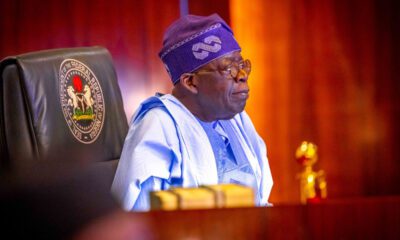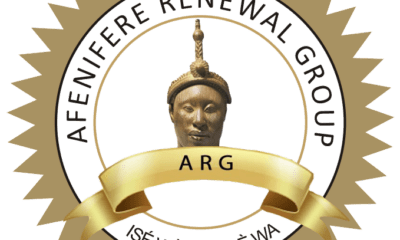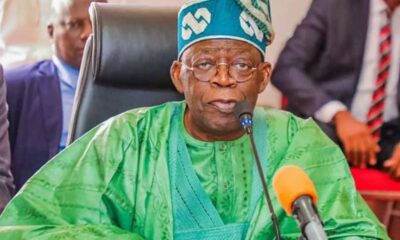Opinion
In eight months of Tinubu administration, Nigeria’s stock market leads the world
By Bayo Onanuga
The Nigerian economy is looking good in some sectors. This is not a harebrained assessment, despite the high inflation and the unstable exchange rate of the Naira. Those who doubt this don’t need to look far, for a reality check. The economic boom is happening at the Nigerian Exchange, where stockholders are not only recording unprecedented capital gains, but are poised to earn equally unprecedented dividends on their investments. The prosperity promised by President Bola Ahmed Tinubu during the campaign is becoming a reality, for millions of Nigerian investors, among whom will be the 6.6 million Nigerian shareholders of MTN, the biggest telco in the country.
The upswing in the market began 30 May 2023, the second day Tinubu was sworn into office. What triggered the big rally in the market was the announcement by the new President of the end of the fraudulent petrol subsidy regime. The market took notice of this bold measure, along with the President’s promise to harmonise the exchange rate. Although the latter remains ‘work-in-progress,’ it has been a bullish run in the market since then.
The All Share Index which tracks the general market movement of all listed equities on the Nigerian exchange was 55,738.35 on 30 May 2023, a day after Tinubu was sworn in. In July it rose to 65,091. By 24 December, it reached 73,768, which as Bloomberg reported on 1 November, when the ASI first crossed the 70,000 mark, was the highest on record.
As at the close of trading on Friday 19 January, the index leapfrogged to 94,538.12, more than 69 percent growth, since last May, creating yet another huge record.
Market capitalisation also grew exponentially from N30.3 trillion recorded at the end of May 2023 to N51.7 trillion on 19 January 2024. This means investors have gained more than N20 trillion since Tinubu came into office.
The record gains have made the Nigerian Stock Market the best in the world, outperforming the MSCI Emerging Markets Europe, Middle East and Africa Index.
Not surprising, investors are bringing more and more money to the market. Last Friday alone, 844.4 million units of stocks valued at N15 billion were traded in 15,255 deals.
The phenomenal growth of the market was fuelled by the record profits announced by many Nigerian banks and some of the manufacturers, such as Dangote Cement, Bua Cement, Lafarge Africa, formerly known as WAPCO.
The banks were the first to rally the market into a frenzy, beginning from their second quarter reports, when they reported huge gains from their forex dealings. Zenith announced earnings per share in H1 at N9.29 from N3.55 in the same period of 2022. UBA’s earnings per share stood at N10.95 in H1 2023 from N1.98 per share in the same period of 2022.
The positive Q3 reports also threw the market into more frenzy as banks announced further increases in profits. Investors, in response, lapped up the shares of the banks, sending the prices higher.
UBA Plc which at the beginning of 2023 was trading at about N8 has seen the biggest jump in its stock price. By last Friday, it traded for N32. Access Bank which started the year at about N11-N12, has soared to N29. Zenith and GTCO are now trading in the N40s, from about N24-25 in January 2023. First Bank , FCMB, Fidelity, Sterling, Wema, Stanbic have all experienced the upswing in prices.
Dangote Cement, Bua Cement and Bua Foods, Flour Mills of Nigeria, Okomu Oil, Presco, Transcorp, NAHCO and WAPCO have similarly experienced some boom. Dangote on Friday, sold for N538, adding N48.9 to its weight, from its previous close of N489.9. WAPCO, otherwise known as Lafarge Africa, traded at N31 in December. On 19 January, it traded for N47.
The rise in stock prices is being propelled by investors who are taking positions, according to EDC Securities Research, ‘in fundamentally driven stocks as we approach the earnings season.” The expectations and sentiments out there among the investors are that some dividend windfall is on the way.
The prosperity promised by the Tinubu administration may not be felt by all our 200 million people simultaneously. But it will not be far away as the government confronts the low inflow of forex into the economy, the fundamental reason the exchange rate has gone bonkers and prices of imported and locally produced goods have increased.President Tinubu and his cabinet expressed concern about the rising costs of pharmaceutical products at the last Federal Executive Council meeting. His government is poised to implement a series of measures to assist local drug manufacturers so that they lower the costs.
To address the low forex inflow, Nigeria is discussing as much as $1.5 billion of World Bank funding support for the budget, Finance Minister Wale Edun said in a Bloomberg Television interview. The country is also looking forward to the fulfilment of the pledge by Saudi Arabia to invest billions of dollars in our economy. NNPC Limited in the coming weeks will continue to be under pressure to bring in more dollars into the country’s foreign reserve to boost dollar availability and overturn bleak predictions for the national currency in 2024.
Onanuga is the Special adviser, Information and Strategy to President Bola Tinubu.
Opinion
Defining policies of President Bola Ahmed Tinubu’s first year in office


By Kenechukwu Aguolu FCA, PMP, CBAP
As President Bola Ahmed Tinubu approaches the first anniversary of his administration, Nigerians reflect on the impact of his “Renewed Hope” agenda. While some citizens are optimistic about his capacity to bring about significant changes, others maintain a stance of indifference or skepticism. Notably, two major and contentious policies—namely, the removal of fuel subsidies and the floating of the naira—have defined his tenure so far.
The rationale behind the removal of fuel subsidy was that Nigeria could no longer sustain the financial burden of subsidising fuel. By ending the subsidy regime, the government aimed to free up funds for investment in critical sectors such as infrastructure, healthcare, and education. Fuel Subsidy removal led to an immediate sharp increase in fuel prices, which also led to a rise in the cost of living. Commuting expenses skyrocketed, making it hard for many workers to afford daily transportation. The higher fuel prices have also significantly contributed to food inflation, making necessities increasingly unaffordable for many Nigerians
Federal government employees received wage awards as a temporary relief measure. However, the promise of a new national minimum wage remains unfulfilled, adding to the financial stress of many households. State governments also provided wage awards at varying rates, but these have been insufficient to offset the increased cost of living. The delay in the provision of Compressed Natural Gas (CNG) buses, expected to alleviate transportation costs, has further compounded the problem.
As part of efforts to stabilise Nigeria’s economy, President Tinubu directed the Central Bank of Nigeria to float the naira, allowing market forces to determine its value. Though anticipated to cause short-term volatility, it is expected to lead to a more stable and realistic exchange rate in the long run. The floating of the naira has led to significant foreign exchange losses for many companies, particularly multinationals, which reported losses running into hundreds of millions of naira. The cost of doing business has increased, with higher prices for diesel, raw materials, machinery, and spare parts, creating a challenging environment for businesses of all sizes.
However, the Federal Government must be commended for clearing its foreign currency backlogs, which has boosted confidence among foreign investors, thereby enhancing Nigeria’s appeal as a global investment hub. Consequently, there has been an increase in both foreign direct investment and foreign portfolio investment. Also commendable are the palliative measures implemented by the government. Conditional cash transfers have provided some relief, and the distribution of grains and foodstuffs has aimed to support vulnerable populations struggling with food inflation. However, some people doubt the actual impact of these initiatives, questioning their effectiveness and the potential for corruption. Additionally, intervention programs such as a student loan scheme and a consumer credit scheme for workers are about to commence, aiming to provide further support and economic opportunities.
Furthermore, the commencement of operations at the Dangote Refinery has sparked optimism, as its production has already resulted in lower diesel prices. Anticipation runs high for a similar decrease in petrol (PMS) prices once the refinery commences PMS production. This development is a potential catalyst for transformation in Nigeria’s energy sector and the broader economy. Moreover, it is expected to contribute to stabilising the naira by enhancing the country’s balance of trade.
Nevertheless, as Nigerians persevere through the immediate challenges posed by these economic adjustments, urgent measures must be taken to rebuild public confidence and enhance living standards. Establishing a fair and sustainable minimum wage is paramount. Additionally, fulfilling the promise of introducing CNG buses would greatly alleviate the transportation expenses of citizens.
In his inaugural year, President Tinubu has made bold, albeit controversial, choices geared toward securing Nigeria’s economic future. The removal of fuel subsidies and the floating of the naira applauded by international bodies like the IMF, has led to significant hardship for ordinary Nigerians. Nigerians are eager to see tangible improvements in their daily lives, hoping that the long-term benefits promised by President Tinubu will soon outweigh the short-term difficulties. As his administration progresses, striking a balance between providing immediate relief and implementing sustainable economic reforms will be crucial in realizing the renewed hope envisioned for Nigeria
Kenechukwu based in Abuja can be reached via [email protected]
Opinion
Mr Olabode Gabriel Omowayeola: A cut above the rest


Mr Olabode is a cut above the rest, and so is the University of Ibadan where our path first crossed.
He was doing a Master’s degree programme at the time. His focus level while reading a huge book in the library reminded me of a scientist investigating a piece of matter under a microscope. That was the first point of attraction.
Mr Olabode is a different breed of Philomath who loves cross-border education even more than a monkey loves banana. From the University of Ibadan, he proceeded to Uskudar University Turkey where he studied Turkish language and Literature.
I relied on the far-reaching, long arm of coincidence to cross our paths for the second stint, and Oh Sweet Goodness, we crossed paths again at Uskudar University Turkey – sumptuous camaraderie! We spoke Turkish language; ‘Merhaba, seninle tekrar tanýþtýðýma memnun oldum’ meaning ‘Hello, nice to meet you again.’
Again, at Istanbul Kultur University Turkey, it was a ray of sunshine as we crossed our paths for the third stinct. This time, it was for a Master’s degree programme in International Relations and Government.
Like a piece of iron on a magnet, we not only went in the same direction, but shared the spoils as the overall best students.
As yearning as the deer for running streams, Mr Olabode’s yearning for knowledge and career advancement is in the zone – he proceeded to Memorial University of Newfoundland Canada as a research student of Political Science.
He stands tall amidst the massive collection of researchers of International Relations and Political Science in terms of contribution to new knowledge.
On the humanitarian side, Mr Olabode is as satisfying as a glass of chill water after a marathon.
He reminds me of the biblical seed that fell on a rich soil. Blind people who encounter him are able to climb the Iroko tree with their hands in pocket – a practically inspirational genius of the 21st century.
Cheers on your annibirthsary!
Jamesleo Oche, Researcher, Cranfield University, British Defence Academy, England, United Kingdom
Opinion
Dapo Abiodun: After five phenomenal years, three glorious years beckon


By Kayode Akinmade
He came into office amid ceaseless assaults by a violent Establishment. He had no handover notes. But he had an agenda, a steely resolve, and a burning passion to transform the Ogun environment. Today, five years on, even the most cynical observer would admit that the Iperu-born prince and boardroom genius has turned the Gateway State around, infused a climate of excitement into governance and state management, building joy and hope for the future in the populace. This is remarkable in a country long hobbled by politicians’ failed promises.
Perhaps the most salient aspect of Abioduns’ leadership is the climate of peace actively fostered in the state. Peace pervades the length and breadth of the land because the Sheriff in charge is determined to leave a lasting legacy of life-changing projects behind, and would not be drawn into political brawls even when a predecessor, taking advantage of the calm in the land, tours the senatorial districts, staging hate campaigns. That is not by accident. Abiodun is a transformational leader, and transformational leaders, as the leadership expert and presidential biographer James MacGregor Burns tells us, are those who, in company with their followers, advance to a higher level of morals and motivation. The fact cannot be disputed that through the strength of their vision and personality, transformational leaders inspire their followers to a higher level of intellectual stimulation, and hence social change.
Against this backdrop, Ogun being rated as Nigeria’s most peaceful state comes as no surprise. People tend to copy what they see their leaders doing. Ogun people have not forgotten the highly instructive incident that took place shortly after their Governor assumed office. Some pastors of the RCCG had been kidnapped while he was away in Abuja on official business. Given the viciousness of the outlaws, hope was low regarding their rescue. But the Governor simply requested for and obtained helicopters for aerial surveillance of the target area, and all the clergymen were rescued unhurt. Jubilations erupted in many places…
The Abiodun administration initiated the Security Trust Fund, rallying stakeholders to contribute to the fight against crime. It procured over 100 patrol vans, motorcycles, walkie-talkies, and other security equipment to enhance the operational efficiency of security agencies. Then came an additional 25 patrol vans and surveillance drones in collaboration with Lagos and Oyo States to monitor activities along the Lagos-Ibadan Expressway. And then came Amotekun, deployed at flashpoints…
Because Ogun is calm, the strides in agriculture, the mainstay of the Nigerian economy, have been simply phenomenal. Through the Anchor Borrowers Programme, the Abiodun administration has revolutionized youth involvement in agriculture. It created the Ogun State Investment Promotion Agency (OGUNIPA) and the Ogun State Business Executive Council (OGUNBEC) to make the Gateway State the destination of choice for investors. The administration empowered thousands of farmers through training, capacity building and provision of farming inputs, and Ogun is now a leading producer of rice, maize, and cassava in Nigeria. The story cannot be different with Abiodun’s heavy investment in the development of agricultural infrastructure, including irrigation systems, farm roads, and storage facilities.
When a government fosters partnerships with private sector players, attracting investments and driving growth; implements initiatives to improve livestock production, including the distribution of breeding stock, veterinary support, and establishment of grazing reserves, the result is bound to be refreshing.
The Abiodun administration has strengthened extension services, providing farmers with access to expert advice, technology, and best practices to improve their productivity and efficiency. It has supported farmers to produce high-quality products and linked them to markets and processors. It has created thousands of jobs in the agricultural sector, having developed and implemented policies like the Ogun State Agricultural Policy and the Ogun State Livestock Development Policy. There is no space to detail the government’s empowerment of farmers with solar pump machines; the N50 million Ijebu Development Initiative for Poverty Reduction (Eriwe) meant to develop the fish subsector in the state; the empowerment of over 40,000 agripreneurs in cassava cultivation, or the distribution of motorcycles to extension agents to reach farmers in remote areas across the state.
In education, the abolition of all levies spiked enrolment in primary schools, even as the government adopted a school per ward for development as a model school. The promotion of teachers and equipment of schools and higher institutions and revolution of the transcript processing system has restored dignity to Ogun schools. And among the giant strides of the Abiodun administration, the Gateway International Airport, an agro-cargo facility situated in Remo North, has garnered global attention, with dignitaries and investors expressing interest in its immense socio-economic benefits. It will generate approximately 50,000 direct and indirect jobs. Fittingly, President Bola Ahmed Tinubu has approved the Special Agro-Cargo Processing Zone as a Free Trade Zone. Actually, what is on the ground is an airport city, with an agricultural processing zone located close by. Exporters of farming produce are about to experience an absolute windfall.
Although the state of federal roads—and they are so many—in the state presented challenges during Abiodun’s first term, the story is fast changing. Go to Ota and see things for yourself. In any case, listing the roads constructed by the Abiodun administration is a daunting exercise. Infrastructure is the first pillar of the ISEYA mantra but accorded it a top priority attention in the scheme of programmes being executed. Notable among these roads already completed are the 3.41km Olomore Sanni Road,0.9km Elega Mokola Bridge Entrance, 2km Idi -Aba Elite, Oke Lantoro Road, 1.62km Ijaiye-Oke Ejigbo-Iporo Ake Road,7.8km Obantoko Road (Fajol America junction-Unity Estate Gbonagun, 5.7km Somorin-Kemta Idi -Aba Road, 42km Abeokuta Sagamu Expressway, 3km Panseke Adigbe Road, 6.6km Siun Owode Road, 2.35km Arepo Road,8km Revised s Scope Mowe Ofada Road, 1.5km Kuforiji Olubi Quarry Road Adigbe and 1.85km Iyana Oloke junction to Mapoly School Gate. Then we have the 3.1km Ikoritameje Adenrele/Olose Titun Vespa Road,2.4km Olusegun Osoba Toyin Agbado Road,1.5km construction of Sango Ota -Oke -Aro-Ojodu Abiodun Road Lagos End(Yakoyo to Mr Bigg),2.0km Inner Roads,Itori Junction Road, 4km Oba Erinwole Road,Sagamu,13km Sagamu -Ode Lemo Road,3km Idarika Street Road,8km Orile Oko Road,3km Awujale Road,Stadium and Oke Aje,1.2km Ogbagba Street, Ijebu Ode, etc. The Atan-Lusada-Agbara roads are a marvel. Housing estates covering different strata of society complement the good roads.
Enter the health sector, a sector for which even the Federal Government acknowledged Ogun’s exemplary status during the COVID-19 pandemic. We are talking of an administration that inaugurated State Emergency Medical Treatment Committee to enhance the Ambulance and Emergency Service delivery, conducted training for health workers on comprehensive screening for newborns to tackle sickle cell disease and secured, for the first time in 45 years, full accreditation and upgrade of the Ogun State Schools of Nursing and Midwifery to collegiate status. We are talking about an administration that targeted 1.4m school-age children as change agents, promoted partnerships across the three tiers of the health sector, introduced free Covid-19 rapid testing of residents in health facilities, inaugurated Sexual Therapy and Assaults Referral Center in Olabisi Onabanjo University Teaching Hospital (OOUTH), the Family Planning Center at the State Hospital, Ijebu-Ode, and distributed over 25 Tricycle Ambulances to rural areas.
The administration upgraded and increased the fleet of Ogun State Ambulance and Emergency Services from four vehicles inherited to 26 in two years, introduced 24-hours Ambulance and Emergency Services across the 20 LGAs, carried out free eye surgeries, contained cholera outbreaks, distributed 3.7m insecticide treated nets, commissioned two molecular laboratories to boost the State’s testing capacity for COVID-19 and other epidemiological diseases, and contained COVID-19 with less low fatalities. Have you been to the Clinical Skills Development Laboratory at the School of Midwifery, Abeokuta? It is the work of the same government that increased the ambulance fleet from 6 to 30 to cater for emergencies, distributed ultrasound machines to facilities across the state, commenced 24-hour ambulance service, inoculated students against cervical cancer and established Ambulance Points in all the nine federal constituencies.
With Abiodun’s strategic foresight, Ogun can look towards the future with hope. Long before the FG removed subsidy on fuel, Abiodun initiated CNG-run vehicles, tricycles and motorcycles in the state. Long before the economic downturn that attended subsidy removal came, he floated the Ogun-Kebbi Joint Commission on rice production. Ogun, as attested to by multiple awards, including:
- Best State in ICT Penetration and Adoption by the National Council on Communication and Digital Economy
- Best State in ICT Infrastructure Development also by the National Council on Communication and Digital Economy
- Best State Governor with the Most Improved State in Security Infrastructure by Business Day Newspaper
- Best Governor in Education by the National Parent-Teacher Association of Nigeria
- Best Governor in Agriculture by the Nigerian Agriculture Awards
- Best Governor in Housing Delivery by the Nigerian Housing Awards
- Best State Governor with the Most Improved State in Agriculture and Economic Empowerment by Business Day Newspaper
Outstanding Political Brand Personality of the Year by Marketing Edge Summit and Awards
Best Governor in Infrastructure in the South West by the Nigeria Union of Journalists (NUJ) B zone.
Best Governor in Industrial Revolution at the Award of Excellence in Public Service by President Muhammadu Buhari
2023 “Governor of the Year” Award by Sun Newspapers
2023 “Man of the Year” Award by Silverbird Television and the Daily Independent Governor of the Year award 2023 in Nigeria’s ICT hub. The technology-driven state is poised for greater heights. That is the story of the state under Dapo Abiodun.
Akinmade is Special Adviser on Media and Communications to the Governor of Ogun State.
-
Finance4 months ago
Court orders Sen. Victor Umeh to repay N136m bank debt to AMCON
-



 Abuja Update3 months ago
Abuja Update3 months agoUNDP, FG partnership needed to achieve inclusion, equity- Minister
-
Abuja Update2 months ago
Banks drive stock market performance with N147bn gain
-
capital market2 years ago
Rt.briscoe, FBNH, Others halts negative performance of stock market
-
Submission Guidelines5 months ago
CALL FOR SUBMISSIONS: POETRY COLUMN-NND
-



 Health1 month ago
Health1 month agoCapacity training will reduce migration of health workers- NPHCDA
-



 Business4 weeks ago
Business4 weeks agoTingo Group unveils Tingo Electric, Tingo Cola drink at Lagos launch
-
News5 months ago
Oil thieves sponsoring malicious media campaign against Navy – Spokesman














